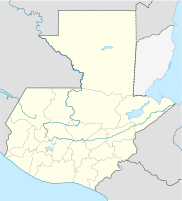Lanquín
| Lanquín | ||
|---|---|---|
|
Coordinates: 15 ° 35 ′ N , 89 ° 59 ′ W Lanquín on the map of Guatemala
|
||
| Basic data | ||
| Country | Guatemala | |
| Department | Alta Verapaz | |
| City foundation | August 28, 1542 | |
| Residents | 17,124 (2004) | |
| - in the metropolitan area | 1.963 | |
| Detailed data | ||
| surface | 208 km 2 | |
| Population density | 82 inhabitants / km 2 | |
| height | 380 m | |
| Waters | Río Lanquín, Río Cahabón | |
| Post Code | 16011 | |
| Time zone | UTC −6 | |
| City patron | San Agustín (festival: August 24th to 28th) | |
| Lanquín Church | ||
Lanquín (also San Agustín Lanquín ) is a place in Guatemala and the administrative seat of the large municipality of the same name in the Alta Verapaz department . Around 20,000 people live in the 208 km² municipality and around 2,000 in Lanquín.
geography
Lanquín is located at the eastern foot of the Alta Verapaz mountain range at an altitude of about 400 m. The country is shaped by the valley of the Río Lanquín and Río Cahabón and their smaller tributaries. In contrast to the highlands further to the west, the climate here is already shaped by the tropical lowlands of Izabal .
Lanquín is bordered by the municipality of San Pedro Carchá to the southwest, west and northwest , Santa María Cahabón to the northeast and east and Senahú to the southeast .
population
95 percent of the population belongs to the Maya ethnic group Kekchí , the rest are Ladinos . The municipality comprises 53 rural communities ("Aldeas").
history
Lanquín was founded on August 28, 1542 by Dominicans in place of an older Kekchí settlement called Lamquim ("Stohdorf"). The first church consecrated to Saint Augustine was built by 1550, but shortly afterwards it was destroyed by fire. The construction of a new church in Spanish colonial style began in 1574. Large parts of this church were destroyed by an earthquake in 1810. In 1843 Lanquín was elevated to a municipality, in 1956 a national park because of its sights, a national monument in 1970 and a cultural monument in 1997 .
Attractions
2 km west of Lanquín is a gigantic cave system ( Grutas de Lanquín ), the extension of which amounts to more than 100 km. This is where the Río Lanquín rises, which a few kilometers further on, at Los Encuentros, flows into the Río Cahabón. The notorious rafting trips on the Cahabón generally start at Lanquín. The tourist attraction Semuc Champey is 11 km south of the village .
Economy and Transport
Lanquín is located about 63 km east-northeast of Cobán , the capital of Alta Verapaz. From there it can be reached via the national road 5, which is sometimes poorly developed, via San Pedro Carchá and Pajal. In Pajal, a steep branch line branches off to Lanquín on the right. The place benefits from tourism. Agriculture is of great importance.
Web links
- Official Website (Spanish)
- Tourist information (Spanish)



